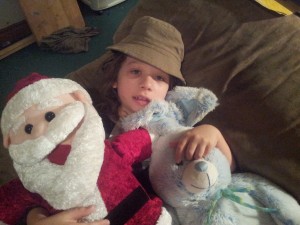When an article entitled “5 Things You Should Never Say To A Stay-At-Home Mom” appeared in my Facebook feed a couple of days ago, I knew there was going to be trouble. The article itself was innocuous – a little unintentionally judgy, perhaps – but the comments section was a virtual bloodbath. Work-outside-the-home moms were claiming to be busier than stay-at-home moms. Stay-at-home-moms were claiming to be there for their kids more than work-outside-the-home moms. Each side was claiming, without actually saying it directly, to be better than the other side.
As I was reading this, I was thinking about what a shame it is that there even are sides. What happened to the days when parents were just parents? At what point did moms and dads become so insecure that they started resorting to competitive parenting? There seems to be a constant game of one-upmanship in which people talk about the sacrifices they have made and the difficulties they have endured in order to be the Perfect Parents.
Here are some of the problems I see with today’s trend of competitive parenting:
It smacks of judgment, and that’s just not right. Unless you are beating, starving, neglecting or otherwise abusing your kids, you’re doing fine. Stay-at-home moms are not better than work-outside-the-home moms. Work-outside-the-home moms are not better than stay at home moms. You’re not a better or worse parent just because you give your kids boxed mac-and-cheese, or limit their screen time, or give up on arguing with them over a chore and just do it yourself. We are all parents, and we all do the best we can with the circumstances we find ourselves in.
It ignores the fact that everyone’s situation is unique. We humans love to categorize and compare things. Stay-at-home moms vs. work-outside-the-home moms. Breastfeeding moms vs. formula feeding moms. Free-range parents vs. helicopter parents. The trouble with classifying everything is that it leads to division, and it assumes that everyone in the same “group” is the same. Some stay-at-home moms love spending all of their time with their kids, and others yearn for the workplace. Some formula feeding moms would really love to breastfeed, and some breastfeeding moms really don’t enjoy it. Even within the same family, things can be different. I can free-range parent my younger son, but my older son, who has autism, requires a much more hands-on approach.
It places too much emphasis on the distinction between doing things out of choice and doing things out of necessity. Many work-outside-the-home moms really don’t have a choice. They need the income just to pay the mortgage and put food on the table. But some work-outside-the-home moms choose to work outside the home. And guess what? That’s OK. I don’t know why so many people have this notion that parents are not allowed to make a single decision in their own self-interest. I mean, sure, if you’re leaving your three-year-old at home alone for eight hours a day just so you can pursue a career, that’s a problem. But if you are taking care of your kids, protecting them from harm, and doing what you can to help them become mature, well-rounded individuals, nothing else really matters.
It takes the focus away from what we really need to be doing. When it comes down to it, these attempts at competitive parenting don’t accomplish a single thing. They are merely distractions that give parents something to argue about when there are so many other things for us to be devoting our energy to.
This is an original post by Kirsten Doyle. Photo credit: Jason Bolonski. This picture has a creative commons attribution license.













